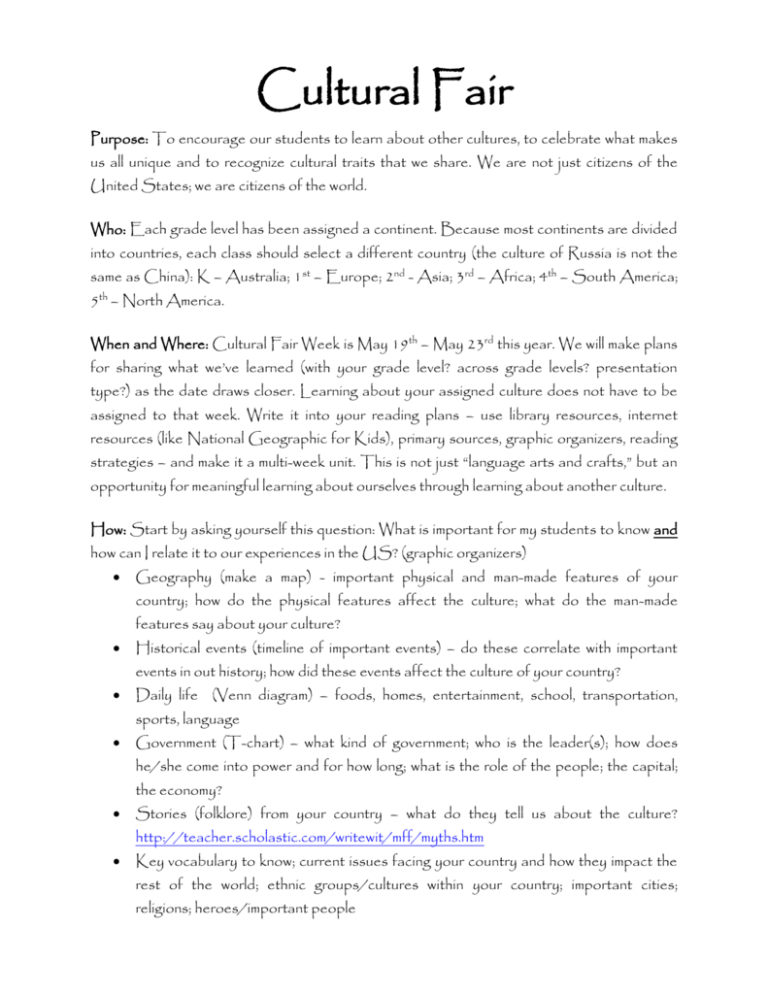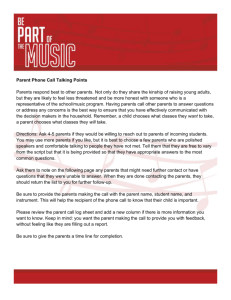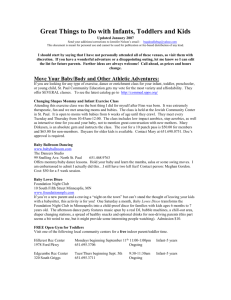Cultural Fair - Lake County Schools
advertisement

Cultural Fair Purpose: To encourage our students to learn about other cultures, to celebrate what makes us all unique and to recognize cultural traits that we share. We are not just citizens of the United States; we are citizens of the world. Who: Each grade level has been assigned a continent. Because most continents are divided into countries, each class should select a different country (the culture of Russia is not the same as China): K – Australia; 1st – Europe; 2nd - Asia; 3rd – Africa; 4th – South America; 5th – North America. When and Where: Cultural Fair Week is May 19th – May 23rd this year. We will make plans for sharing what we’ve learned (with your grade level? across grade levels? presentation type?) as the date draws closer. Learning about your assigned culture does not have to be assigned to that week. Write it into your reading plans – use library resources, internet resources (like National Geographic for Kids), primary sources, graphic organizers, reading strategies – and make it a multi-week unit. This is not just “language arts and crafts,” but an opportunity for meaningful learning about ourselves through learning about another culture. How: Start by asking yourself this question: What is important for my students to know and how can I relate it to our experiences in the US? (graphic organizers) Geography (make a map) - important physical and man-made features of your country; how do the physical features affect the culture; what do the man-made features say about your culture? Historical events (timeline of important events) – do these correlate with important events in out history; how did these events affect the culture of your country? Daily life (Venn diagram) – foods, homes, entertainment, school, transportation, sports, language Government (T-chart) – what kind of government; who is the leader(s); how does he/she come into power and for how long; what is the role of the people; the capital; the economy? Stories (folklore) from your country – what do they tell us about the culture? http://teacher.scholastic.com/writewit/mff/myths.htm Key vocabulary to know; current issues facing your country and how they impact the rest of the world; ethnic groups/cultures within your country; important cities; religions; heroes/important people Activities to Try: (I have examples of many of these to share with you.) Create a realia table in your room with books and objects representing your culture that students can access (background knowledge) Pen pals or web pals with a class from the country you are studying or teacher writes letter to class as a person from the country you are studying, and the students respond (or students write as if they are from that country and the teacher writes from the perspective of someone from our country) Make a book to organize your studies – a folder; a foldable book with labeled pockets; a flip book; a “scrapbook”; etc. A diary written as if the student lived in the country you are studying – an entry for each topic you study (geography, family life, school, government, etc.) A Writing Menu (from Melissa Forney) – create a list of activities related to your study of a culture and assign them points (appetizers and desserts are worth fewer points, main courses are worth more) Reader’s Theater using a folktale from your country Write a fractured folktale (i.e. The Israeli Cinderella or The Tortilla Man - instead of Gingerbread Man) incorporating people, places, events that are important to your selected culture Incorporate reading strategies throughout – compare/contrast, sequencing, main idea and details, problem/solution, etc. Utilize small groups/cooperative groups/ jig saw groups to do research, then come back together to share (i.e. Daily Life – assign each group a topic from above, provide books and magazines for them to locate info, then have groups share, adding their info to a Venn Diagram, complete the US and “both/shared” sections of the Venn Diagram as a class) Wax Museum – student groups plan and perform scenes from their culture like wax statues in a museum; as visitors walk through the museum, a docent (tour guide) explains the scene; relics (items that would be found in a museum) Art Museum – student groups create art (in a variety of formats) that represents the culture you’ve studied Student-created Performances – plays, music, art pieces, etc. Create a PowerPoint presentation about what you’ve learned - take your own photos and use photos found on the web from your country (comparing two cultures) or just assign each group a topic on which to create a PowerPoint page Resources: Check with Michelle and Cindy for library resources – with enough notice they can gather materials for you. Call the librarians at your local library. They can also gather materials for you. I have a book called Read Around the World with 20 Great Picture and Chapter Books that may be helpful. Ask Mr. Bonner and Mrs. Mickens if they have any suggestions or can incorporate your topics in their lessons Primary sources are those items related to your topic that come “straight from the horse’s mouth” – people who are from your country, stories/articles written by someone who lives in your country, items/materials from your country Check out United Streaming Web sites that may be helpful: * Kid Info Bits (kid-friendly research engine) – from the intranet homepage – Destiny – RLE – Kids Info Bits http://galenet.galegroup.com/servlet/KidsInfoBits?locID=fl_lake * Scholastic for Kids – just type in your search term; good for current events and research http://www.scholastic.com/kids/ * Time for Kids http://www.timeforkids.com/TFK/news/index.html * National Geographic for Kids http://kids.nationalgeographic.com/ * http://www.kidsclick.org/ (type your country’s name in the search field) * Reader’s Theater (look for one representing your country) http://www.aaronshep.com/rt/RTE.html; * Pen Pals - http://www.studentsoftheworld.info/menu_penpals.php3 (this one has a good listing of countries within each continent – to help you choose a country to study); http://www.epals.com/; http://www.europa-pages.com/epals/schools.html * Do a Google search (try different topics, like your country photographs or your country culture) - some I came up with from a general “kids culture resources” search: http://www.kidsculturecenter.com/russia/russia.htm http://pbskids.org/africa/myworld/index.html http://www.asiaforkids.com/









